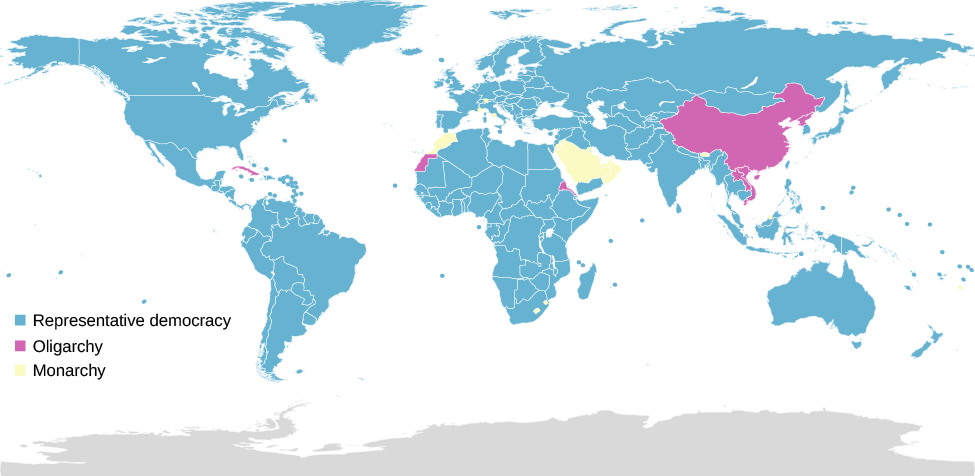| << Chapter < Page | Chapter >> Page > |
Civic engagement, or the participation that connects citizens to government, is a vital ingredient of politics. In the United States, citizens play an important role in influencing what policies are pursued, what values the government chooses to support, what initiatives are granted funding, and who gets to make the final decisions. Political engagement can take many forms: reading about politics, listening to news reports, discussing politics, attending (or watching televised) political debates, donating money to political campaigns, handing out flyers promoting a candidate, voting, joining protest marches, and writing letters to their elected representatives.
The government of the United States can best be described as a republic, or representative democracy. A democracy is a government in which political power —influence over institutions, leaders, and policies—rests in the hands of the people. In a representative democracy , however, the citizens do not govern directly. Instead, they elect representatives to make decisions and pass laws on behalf of all the people. Thus, U.S. citizens vote for members of Congress, the president and vice president, members of state legislatures, governors, mayors, and members of town councils and school boards to act on their behalf. Most representative governments favor majority rule : the opinions of the majority of the people have more influence with government than those of the minority. If the number of elected representatives who favor a proposed law is greater than those who oppose it, the law will be enacted.
However, in representative governments like the United States,
minority rights are protected: people cannot be deprived of certain rights even if an overwhelming number of people think that they should be. For example, let’s say American society decided that atheists, people who do not believe that God exists, were evil and should be imprisoned or expelled from the country. Even though atheists only account for about 7 percent of the population, they would be protected due to minority rights.
In a direct democracy , unlike representative democracy, people participate directly in making government decisions. For example, in ancient Athens, the most famous example of a direct democracy, all male citizens were allowed to attend meetings of the Assembly. Here they debated and voted for or against all proposed laws. Although neither the federal government nor any of the state governments function as a direct democracy—the Constitution requires the national and state governments to be representative forms of government—some elements of direct democracy do exist in the United States. While residents of the different states vote for people to represent them and to make laws in their behalf in the state legislatures and in Congress, people may still directly vote on certain issues. For example, a referendum or proposed law might be placed on the ballot for citizens to vote on directly during state or local elections instead of leaving the matter in the hands of the state legislature. At New England town meetings, all residents are allowed to debate decisions affecting the town ( [link] ). Such occasions provide additional opportunities for civic engagement.

Most countries now have some form of representative government ( [link] ). At the other end of the political spectrum are elite-driven forms of government. In a monarchy , one ruler, usually a hereditary ruler, holds political power. Although the power of some monarchs is limited by law, and such kings and queens often rule along with an elected legislature that makes laws for the country, this is not always the case. Many southwest Asian kingdoms, such as Saudi Arabia, Qatar, and the United Arab Emirates, have absolute monarchs whose power is unrestricted. As discussed earlier, another nondemocratic form of government is oligarchy, in which a handful of elite members of society, often those who belong to a particular political party, hold all political power. For example, in Cuba, as in China, only members of the Communist Party are allowed to vote or hold public office, and the party’s most important members make all government decisions. Some nondemocratic societies are totalitarian in nature. Under totalitarianism , the government is more important than the citizens, and it controls all aspects of citizens’ lives. Citizens’ rights are limited, and the government does not allow political criticism or opposition. These forms of government are fairly rare. North Korea is an example of a totalitarian government.

The CIA website provides information about the types of government across the world.
Government provides stability to society, as well as many crucial services such as free public education, police and fire services, and mail delivery. It also regulates access to common goods, such as public land, for the benefit of all. Government creates a structure whereby people can make their needs and opinions known to public officials. This is one of the key factors that makes the United States a representative democracy. A country where people elect representatives to make political decisions for them depends on the ability and willingness of ordinary people to make their voices known, unlike an oligarchy dominated by only a small group of people.

Notification Switch
Would you like to follow the 'American government' conversation and receive update notifications?